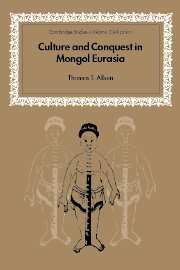Book contents
- Frontmatter
- Contents
- Preface
- Note on transliteration
- Abbreviations
- PART I BACKGROUND
- PART II POLITICAL–ECONOMIC RELATIONS
- PART III INTERMEDIARIES
- PART IV CULTURAL EXCHANGE
- 12 Historiography
- 13 Geography and cartography
- 14 Agriculture
- 15 Cuisine
- 16 Medicine
- 17 Astronomy
- 18 Printing
- PART V ANALYSIS AND CONCLUSIONS
- Bibliography
- Index
- Other titles in the series
17 - Astronomy
Published online by Cambridge University Press: 04 September 2009
- Frontmatter
- Contents
- Preface
- Note on transliteration
- Abbreviations
- PART I BACKGROUND
- PART II POLITICAL–ECONOMIC RELATIONS
- PART III INTERMEDIARIES
- PART IV CULTURAL EXCHANGE
- 12 Historiography
- 13 Geography and cartography
- 14 Agriculture
- 15 Cuisine
- 16 Medicine
- 17 Astronomy
- 18 Printing
- PART V ANALYSIS AND CONCLUSIONS
- Bibliography
- Index
- Other titles in the series
Summary
The Mongols of the imperial era had a system of calendrical reckoning, their own names for constellations, and a folk cosmology, but the formalized astronomy of systematic observation, star charts, and mathematically derived tables comes late, the early eighteenth century, as a by-product of the Tibetan, Indian, and Chinese influence that accompanied the Mongols' conversion to lamaist Buddhism. Despite the lack of a native scientific astronomy, the early Mongols evinced an avid and sustained interest in the study of the heavens. This is manifest in their restoration of existing observatories such as Ögödei's repair of the astronomical facilities in the Chin capital in 1236, and the construction of entirely new centers such as the one at Marāghah undertaken by Hülegü, a subject discussed below. Astronomers, too, were highly prized by the Mongols, as the following anecdote reveals. In the aftermath of the Mongolian defeat at ʿAin Jālūt in 1260, Hülegü in anger ordered that all the subjects of the Egyptian monarch in his territory be put to the sword. One seized for this purpose was a certain Mūhai who signalled to his captors that he was an astronomer and was immediately spared as a matter of standard operating procedure needing no other justification or explanation.
- Type
- Chapter
- Information
- Culture and Conquest in Mongol Eurasia , pp. 161 - 175Publisher: Cambridge University PressPrint publication year: 2001



